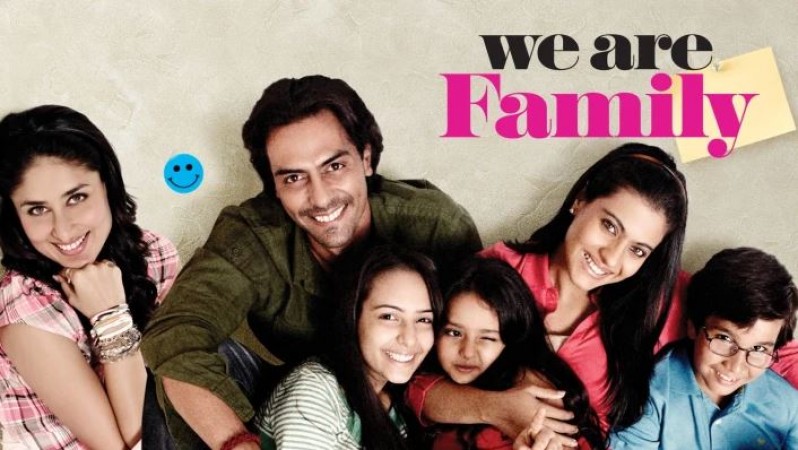
Hollywood has a long history of updating timeless tales in classic movie remakes. One such remake is "We Are Family," which takes its cues from the Julia Roberts, Susan Sarandon, and Ed Harris film "Stepmom" from 1998. Under the direction of Chris Columbus, "Stepmom" depicted the poignant tale of a mixed family coping with the difficulties of divorce and a terminal illness. Bollywood released "We Are Family," a film that honours the original while masterfully reimagining the story, in 2010. This essay will examine the parallels and discrepancies between these two films, focusing on how "We Are Family" was able to preserve the spirit of "Stepmom" while still making it feel entirely original.
"Stepmom" centres on the lives of Julia Roberts' Isabel Kelly and Susan Sarandon's Jackie Harrison. In addition to being a divorced mother of two kids, Luke and Anna, Jackie is also fighting a deadly cancer. The children are initially hostile towards Isabel, Luke and Anna's father's new girlfriend, but as Jackie's condition worsens, she begins to feel more and more connected to them. The movie looks at issues of love, grief, and the difficulties of starting a new family in a challenging situation.
While adding a few new elements, "We Are Family" keeps the main plot intact. The characters of Maya (Kajol), Aman (Arjun Rampal), and Shreya (Kareena Kapoor) are at the heart of the Indian setting of the story. Three children, Aaliya, Ankush, and Anjali, are raised by Maya, a divorced mother. Aman introduces Shreya as his girlfriend to the family after falling in love with Maya. After that, the movie explores blended family dynamics, with a major plot point being Maya's terminal illness.
Character Dynamics: "Stepmom" and "We Are Family" both examine the intricate relationships that exist between the father, his new partner, and his biological mother. In both movies, the father tries to keep things in check, but the biological mother first feels threatened by the new woman in her kids' lives. The children resist the stepmother, who is portrayed by Julia Roberts in "Stepmom" and Kareena Kapoor in "We Are Family," but she eventually warms up to them as a result of their shared experiences.
The presence of a mother who is terminally ill is a major theme in both films. Susan Sarandon plays Jackie in "Stepmom," a character who fights cancer. Maya, played by Kajol in "We Are Family," is afflicted with the same fatal illness. Since the characters in both films are shown coming to terms with loss and mortality, this shared element gives the narratives more depth and poignancy.
Part Played by the Kids: The stories in both films are significantly shaped by the kids. An essential aspect of the narrative is their journey from hatred of their father's new partner to acceptance and even love for her. With its depiction of the cultural and social obstacles Indian children face in adjusting to their father's new relationship, "We Are Family" adds another level of complexity.
Cultural Context: The cultural context is one of the main distinctions between the two films. "Stepmom" explores a primarily Western family dynamic and is set in the United States. On the other hand, the setting of "We Are Family" is India, a country with distinct family structures and social mores. This cultural shift gives the remake a distinct flavour by emphasising the differences between the two settings and the ways in which cultural values shape the decisions and actions of the characters.
Character Development: "We Are Family" provides character development that is specific to its Indian setting, even though the two films have the same basic plot. The rich Indian culture has an impact on the characters' interactions, responses, and feelings, which gives the remake more nuance.
Visual and Musical Elements: "We Are Family" fully embraces the vivid and colourful visuals that Bollywood is known for. There are intricate song and dance scenes in the movie that are absent from "Stepmom." These scenes give the heartfelt tale a distinctively Indian touch by incorporating some Bollywood flair.
Various Outcomes: "We Are Family" has a happier and more hopeful finale than "Stepmom," which has a melancholy one. The Indian adaptation places a strong emphasis on the value of hope and family unity, which is consistent with Bollywood films' larger theme of family values being celebrated.
While incorporating elements of India's rich cultural heritage, "We Are Family" skillfully pays homage to the poignant and emotional story of "Stepmom". This remake is proof of the cross-cultural resonance of universal themes such as love, family, and dealing with terminal illness. "We Are Family" sets itself apart with its distinct cultural background, character growth, and uplifting conclusion, even though the films have similar themes and character dynamics. Each film stands on its own, and seeing them both can offer an insightful look at how the same story can be presented with various cultural quirks. In the end, "We Are Family" is a brilliant illustration of how a remake can pay tribute to its original work while also providing a new and distinctive experience for its viewers.
Papi Gudia and the Chucky Controversy: A Horror Film Face-Off